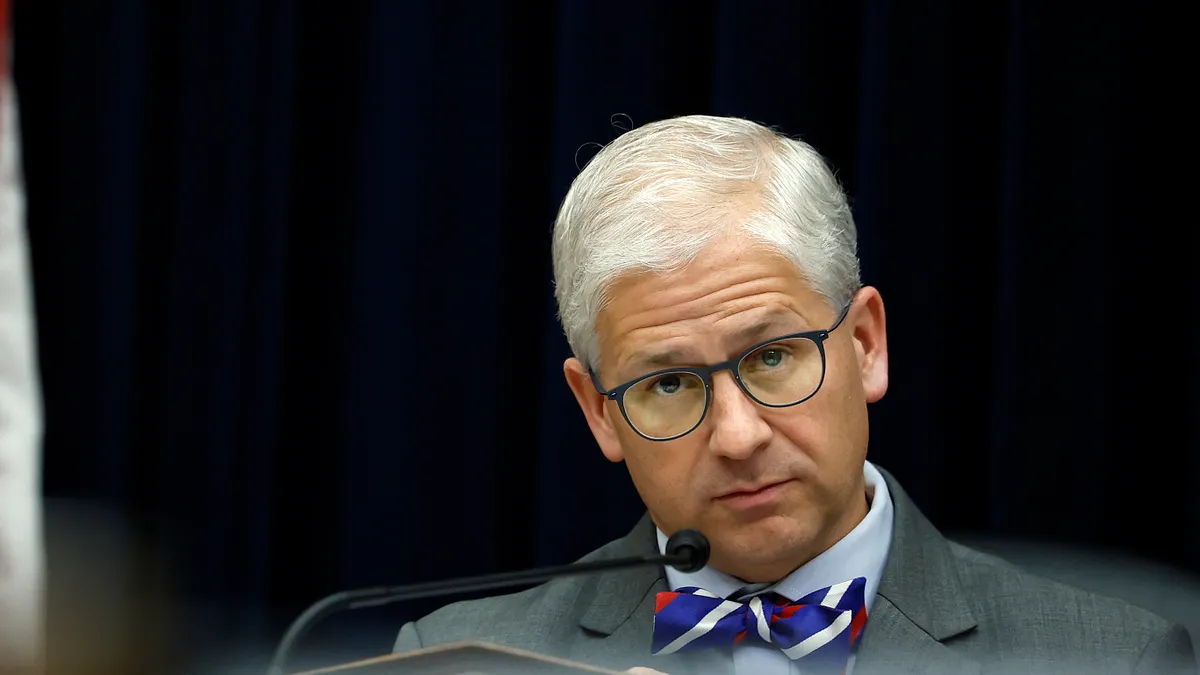Dive Brief:
- House Financial Services Committee Republicans Patrick McHenry and Andy Barr, of North Carolina and Kentucky respectively, sent a letter to the Government Accountability Office Monday seeking the agency’s help as they evaluate federal agencies’ membership in a group that aims to “green” the financial system.
- McHenry and Barr, who respectively chair the full committee and subcommittee on financial institutions and monetary policy, said in the letter they are evaluating the Federal Reserve Board, Office of the Comptroller of Currency and Federal Deposit Insurance Corporation’s membership in the Network of Central Banks and Supervisors for Greening the Financial System.
- The letter, which asked for GAO’s help investigating the group’s funding mechanisms and level of U.S. involvement, signals another target in House Republicans’ attacks on the incorporation of environmental and climate considerations by the financial sector.
Dive Insight:
The Network for Greening the Financial System was established at the Paris One Planet Summit in 2017, with a goal to strengthen the global response needed to hit the goals outlined in the Paris Climate Accords and “enhance the role of the financial system to manage risks and to mobilize capital for green and low-carbon investments in the broader context of environmentally sustainable development,” according to its website.
Since launching with eight central banks and supervisors, NGFS membership has grown to include 138 members and 21 observers, which include the Federal Housing Finance Agency and U.S. Federal Insurance Office alongside OCC, FDIC and the Fed.
McHenry and Barr said there is no public budgetary information available for the NGFS, which is backed by France’s central bank, leaving them “unclear” about how the group is funded. The pair said that, based on responses from OCC, FDIC and Fed officials at a July 2023 hearing, federal banking regulators also “do not appear to have insight into its funding mechanisms.”
McHenry and Barr also noted that the organization counts the central banks of U.S. adversaries China and Russia as members and questioned how much funding the group has received from the two nations.
“Given lack of transparency from U.S. federal bank regulatory agencies, Congress is forced to guess the extent to which officials and researchers from those agencies are actively devoting U.S. federal resources to joint work with the NGFS and related foreign agents, including combing through publications and workstream products on the NGFS’s opaque website,” the letter said.
The Fed joined NGFS in 2020, followed by OCC in 2021 and FDIC in 2022, but each told the Financial Services Committee it never submitted a formal application, according to the letter. McHenry and Barr’s letter looks to GAO to help the committee gain additional insight on the agencies’ record-keeping and information-sharing protocols for NGFS and any records on their membership application process.
The Republican representatives are also looking to learn whether the agencies or any Federal Reserve district banks have confidentiality agreements with the organization or if any of their officials or staff share confidential information with anyone at NGFS or its affiliates. The letter asks how many times each agency has met with the group since joining, including its participation in joint research efforts.
McHenry and Barr also ask for the government watchdog agency’s help in looking into how the financial agencies plan to determine how large banks are adhering to policies on climate-related financial risks; how the agencies plan to internally define “climate transition risk;” and whether federal banking regulators are allowed to “join any international, self-chartered interest group that it wants.”
“Continued research into [the] effects of severe weather and climate change is valuable,” the Republicans wrote. “Prematurely inserting speculation, loose theorizing, and activist-funded data and model-creation imported from opaque global governance bodies is not.”
Another climate coalition has primarily been in focus for House Republicans this year: Climate Action 100+.
Following the high-profile defections of JPMorgan Chase and State Street in February, the House Oversight Committee launched a probe the same month, questioning whether the group’s actions align with antitrust laws. The House Judiciary Committee sent letters to more than 130 of its remaining members in July which triggered another outflow of signatories, including Goldman Sachs and subsidiaries of Franklin Templeton and Sun Life.











